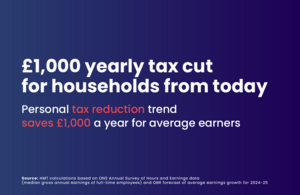Millions of workers are going to start seeing a boost to their take home pay as January’s pay comes into bank accounts across the UK.
With millions of monthly earners just getting paid, a household with two average earners will be starting to see a nearly £1,000 a year benefit from the Chancellor’s record personal tax cut. Thanks to the progress made against its economic priorities, the government announced it will cut National Insurance by 2p from 12% to 10% at the Autumn Statement and made sure it took effect within weeks of the announcement, as part of its plan to reward work and grow the economy.
The change is a more than 15% reduction in National Insurance, saving £450 this year for the average salaried worker on £35,400. Millions of people working different jobs across hundreds of industries will now be better off. To a pub landlord that’s £418 a year, a bus driver £328, a nurse £527.
A teacher will pay £635 less in National Insurance contributions this year. The historic NICs cut takes effect with the government having faced the legacy of Covid-19, and global instability with war in Ukraine and the Middle East.
In the past year, inflation has halved; the economy has recovered more quickly from the pandemic than first thought; and debt is on track to fall. The government is sticking to the plan and is building a stronger economy where hard work is rewarded and ambition and aspiration are celebrated.
Chancellor of the Exchequer Jeremy Hunt said: “I never shied away from making the tough decisions needed yesterday to cut taxes today.
“This January pay boost for hard-working Brits is part of our plan to grow the economy and build a brighter future where hard work is always rewarded, relieving pressure on UK workers by putting around £450 back in their pockets.” The cut means that for those on average salaries, personal taxes would be lower in the UK for single parents with no children than every other G7 country, based on the most recent OECD data.
The UK also has the most generous starting allowances for income tax and social security contributions in the G7. To mark the tax cut, earlier this month HMRC launched an online tool to help people understand how much they could save in National Insurance this year.
The tool uses salary information to give employees personalised estimates of how much they could save because of the government’s changes, and is hosted on the government’s cost of living support website on gov.uk. The last major cut to the current personal tax system of today’s magnitude was when the National Insurance personal allowance increased from £9,880 to £12,570.
This was the largest ever cut to a personal tax starting threshold, allowing working people to hold on to an extra £2,690 free from tax whilst last year taking around 2.2 million people out of paying tax altogether. The cut to National Insurance combined with above-inflation increases to tax thresholds since 2010 means that the average earner will pay over £1,000 less in personal taxes than they otherwise would have done.
The independent OBR says that, by 2028-29 this tax cut will increase the number of people in employment by 28,000 alongside a substantial economic benefit from those in work increasing their hours which the OBR forecast will be equivalent to 79,000 on a full-time equivalent basis. Overall, the OBR says that by 2028-29 this measure will increase the number of hours worked by new and existing employees by 0.3%, or 94,000 in full-time equivalent terms.
At the Autumn Statement the Chancellor Jeremy Hunt announced the biggest package of tax cuts to be implemented since the 1980s. In addition to today’s action, he announced a National Insurance cut for 2 million self-employed people, which will take effect on 6 April 2024 and is worth £350 for the average self-employed person on £28,200.
He also made full expensing permanent, which at £11 billion per year is the biggest business tax cut in modern British history helping businesses invest for less. Over 200 business leaders told the government that it would have the single most transformational impact on business investment and growth.
The OBR says these two measures will increase the number of people in work and grow the economy. He also announced the biggest ever increase to the National Living Wage, froze alcohol duty for six months and extended cuts to business rates relief for the high street.












